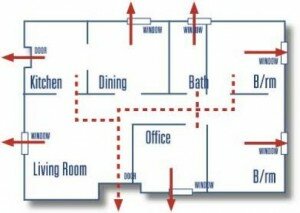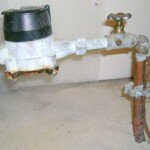6 More Tips for Preparing for a Disaster
When a disaster strikes, it’s important to be able to react immediately, and being prepared is an important part of being able to react. Having a family plan in case of a disaster is important, and so is making sure you have enough supplies. Here are some more tips that can help you if a disaster strikes:
 Have an escape route. Take the time to draw a floor plan of your home and mark escape routes for each room. Make sure children understand the drawings and have a copy in their rooms. Don’t forget to establish a meeting places in the event of an emergency like a fire.
Have an escape route. Take the time to draw a floor plan of your home and mark escape routes for each room. Make sure children understand the drawings and have a copy in their rooms. Don’t forget to establish a meeting places in the event of an emergency like a fire.
Know how to shut off your utilities. In the event of a disaster, you may be asked to shut off utility service at your home. It is important to contact your natural gas provider for instructions on how to turn off service because different gas meters have different configurations.
 To shut off water, locate the shut off valve where the water comes into your home – it may look like this:
To shut off water, locate the shut off valve where the water comes into your home – it may look like this:
Make sure the valve can be completely shut off – if it’s rusted and won’t close you might want to look into replacing it. Label the valve so that everyone in your family knows where it is and how to turn it off.
Know where your insurance information and other records are. Review your existing policies for the amount and extent of coverage that you have in place so you can rebuild if necessary. If you have a hard time understanding your insurance policy, you can call your insurance agent and talk with them about your concerns.
Keep an inventory of your property for insurance purposes. Keep photos or videos of the interior and exterior of your home along with personal items. Keep the inventory, along with important household documents, in a safe place away from your home like a safety deposit box.
 Have a plan for family pets. Just like you, animals can be affected by disasters. Make sure you know a shelter you can take your pets to in case of an evacuation. Gather together pet supplies and vet records, and make sure your pet has proper ID. Provide a carrier and leash for your pet. You can contact your local emergency management office, animal shelter, or animal control office for more advice or information.
Have a plan for family pets. Just like you, animals can be affected by disasters. Make sure you know a shelter you can take your pets to in case of an evacuation. Gather together pet supplies and vet records, and make sure your pet has proper ID. Provide a carrier and leash for your pet. You can contact your local emergency management office, animal shelter, or animal control office for more advice or information.
Know how to stay safe. It is important that family members know how to administer first aid and CPR, and know how to use a fire extinguisher. Check with your local American Red Cross chapter for information on first aid and CPR training.
For fire extinguishers, make sure you have at least an ABC fire extinguisher – one that is effective on wood or paper fires, electrical fires, and liquid fires.


